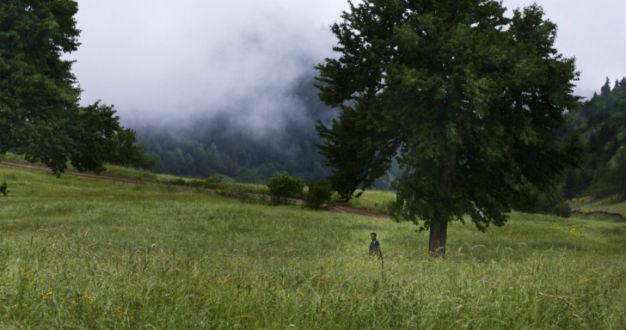‘Memories of the Wind:’ What are we to do with the dead?
Emrah Güler

Before his debut feature of 2008, “Sonbahar” (Autumn), that would shoot him to fame, filmmaker Özcan Alper was already a promising name for those who had watched his bizarrely-titled documentaries, “Tokai City’de Melankoli ve Rapsodi” (Melancholy and Rhapsody in Tokai City) and “Bir Bilimadamıyla Zaman Enleminde Yolculuk” (Travels On the Time Continuum with a Scientist), as well as the critically-acclaimed short “Momi” of 2001.
“Sonbahar” would bring Alper more than a dozen awards, including the C.I.C.A.E. Award at Locarno International Film Festival, four awards at the SIYAD Turkish Film Critics Association Award and four at the Ankara International Film Festival, defining his distinctive cinema and perhaps setting the bar too high for his future films. Memories of lost ones and trying to make peace with history would be the predominant themes in his debut feature and the ones that would follow.
For his first feature, Alper took the idyllic Black Sea region where towering trees meet the sea as the backdrop to his story, the familiar place of his hometown. “Sonbahar” was about returning home to find no home, the heartbreaking story of Yusuf (Onur Saylak), a political prisoner leaving jail after a decade.
Yusuf returns home to his elderly mother, only to find that life has changed with all of his activist friends having divorced from the ideologies that once had brought them together. Yusuf’s mostly silent role was taken to a haunting effect with beautiful cinematography and a string of amateur actors talking in local dialect, prompting the need for Turkish subtitles for a Turkish-speaking audience.
Three years later, in 2011, Alper’s sophomore feature hit theaters. “Gelecek Uzun Sürer” (The Future Lasts Forever), the title an inspiration both from French philosopher Louis Althusser’s memoirs of the same name and a line from a poem of Turkish poet Murathan Mungan, used the Turkish-Kurdish conflict that has claimed thousands of lives in the last three decades as its backbone.
The quote from the Italian writer and poet Cesare Pavese that opens the film pretty much sums up Alper’s sentiments for both of his films, as well as his third feature “Rüzgarın Hatıraları” (Memories of the Wind) that hit the theaters today: “When the war ends one day, we have to ask ourselves this: What are we to do with the dead? Why did they die?”
From southeastern Turkey to the Georgian border
In “Gelecek Uzun Sürer,” a young woman (Gaye Gürsel) travels from Istanbul to the southeastern city of Diyarbakır to research Anatolian elegies for her doctoral thesis. The woman’s journey becomes a harrowing one as she talks to women who have lost their beloved ones, compiling losses along with elegies, facing her own loss, a broken relationship she left behind in Istanbul.
In Diyarbakır, she makes an unlikely friend in a pirate DVD seller (Durukan Ordu), who has first-hand tales of the war in the region. Part road movie, part lament to lost love, and part political drama, the film takes a heartfelt look at the consequences of war on individual lives, concentrating mostly on women.
Alper’s third feature “Rüzgarın Hatıraları” is a more ambitious film, perhaps one in which the director/writer takes on more than he can handle. Set during World War II, the film follows Aram (recasting Onur Saylak), an Armenian painter and poet who flees from Istanbul, in the face of possible danger for his life. He settles in a hut in the forest across the Soviet-Georgia border, where a young man and his wife give him shelter.
As Aram waits for the papers that will take him across the border, he becomes more and more agitated with life in the woods. Through flashbacks, he remembers a painful past that claimed the lives of close ones during the Armenian relocation of 1915. The political drama soon turns into the tale of forbidden love as Aram and the wife, Meryem (Sofya Khandemirova), get closer.
Predictable form from its first minutes, the film becomes a huge disappointment for those who have been waiting for Alper’s next feature. While Alper wants to dissect two distinctive periods in Turkish history, its political concerns stay on the surface. The internal conflicts of the protagonist at the center of the film are barely felt by the audience, with Aram becoming a distant character as the story unfolds. It’s best to keep expectations low and simply enjoy the best thing about the film: Andreas Sinanos’s award-winning photography, capturing the nature in its most naked state.
 Before his debut feature of 2008, “Sonbahar” (Autumn), that would shoot him to fame, filmmaker Özcan Alper was already a promising name for those who had watched his bizarrely-titled documentaries, “Tokai City’de Melankoli ve Rapsodi” (Melancholy and Rhapsody in Tokai City) and “Bir Bilimadamıyla Zaman Enleminde Yolculuk” (Travels On the Time Continuum with a Scientist), as well as the critically-acclaimed short “Momi” of 2001.
Before his debut feature of 2008, “Sonbahar” (Autumn), that would shoot him to fame, filmmaker Özcan Alper was already a promising name for those who had watched his bizarrely-titled documentaries, “Tokai City’de Melankoli ve Rapsodi” (Melancholy and Rhapsody in Tokai City) and “Bir Bilimadamıyla Zaman Enleminde Yolculuk” (Travels On the Time Continuum with a Scientist), as well as the critically-acclaimed short “Momi” of 2001.